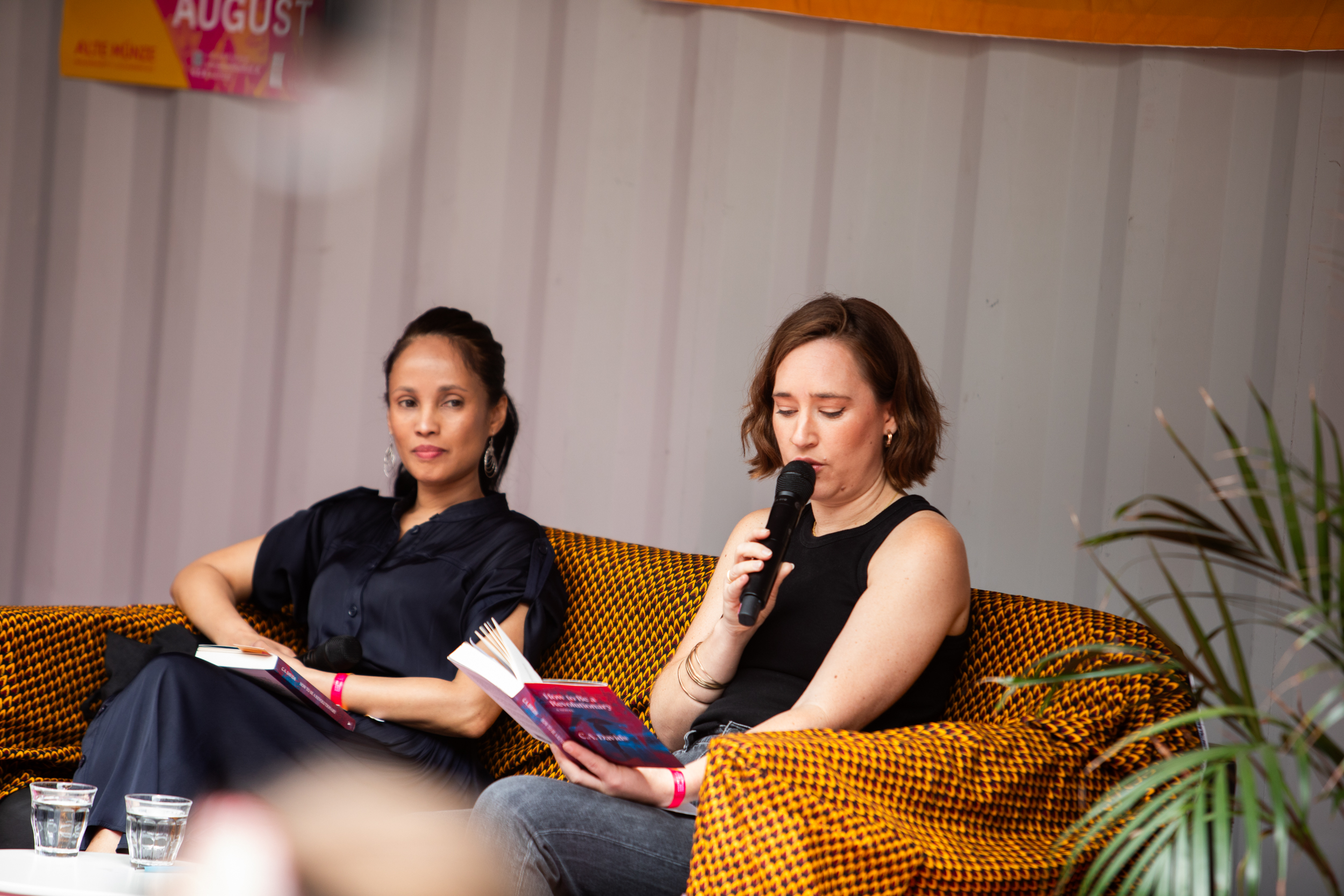
Melancholy hope? CA Davids’s How to Be a Revolutionary at the African Book Festival Berlin
Before the Book Special discussion I was to host with her at this year’s African Book Festival Berlin, CA Davids was somewhat reserved, and on the search for sugar-free cola, “for energy”. This demeanour swiftly gave way to a composed, intently focused one as the conversation began. She spoke in considered sentences as she unpacked the political intent, and mood, of her second novel How to Be a Revolutionary, published last year by Verso. The book, a sweeping story spanning decades, continents and revolutionary histories, has already been translated to German by Susann Urban, published this year by Verlag das Wunderhorn as Hoffnung und Revolution.
“Politics is my first love”, she begins, and it certainly shows as the novel tracks a particular political time and feeling: one where revolutionary hopes give way to futures that fall short of expectation. It is a complex story, succinctly described by the book jacket as “connecting contemporary Shanghai, late Apartheid-era South Africa, and China during the Great Leap Forward and the Tiananmen uprising — and refracting this globe-trotting and time-travelling through [Langston] Hughes’ confessional letters to a South African protégé about the poet’s time in Shanghai [in the 1930s]”. These threads are held together in their connection to Beth, a Capetonian woman of colour, who, having been politicised as a high-schooler into anti-apartheid organising, has acquired a position in the country’s democratic government. Accepting a diplomatic posting to Shanghai, she is increasingly doubtful of her ongoing loyalty to a South African regime that by the 21st century has betrayed its early promises. “When did it start?” Beth wonders, ill at ease, “That creeping, unnerving corruption that seems immovable now? When did it settle into our departments and, it seemed, onto everything in the country, like a layer of grease? Right under my watch?” (25)
Our conversation at the African Book Festival moves quickly to Davids’s own profound disillusionment with the state of the post-apartheid nation. “I grew up as a person of colour during apartheid”, she says, “and I have witnessed the full arc of the country”, from that hopeful time to this disappointing present. Through Beth and her Shanghai neighbour Huang Zhao, whose story is based on that of former-CCP journalist Yang Jisheng, Davids explores her characters’ contradictory yet poignant attempts to remain politically and personally committed to an idea of a changed society, while simultaneously having to reckon with questions of complicity, betrayal, and disenchantment, when those expectations for change aren’t quite fulfilled, or when revolution comes at a cost that may just be too high a price to pay.
For a novel so startling in its breadth and complexity, it retains an intimacy and carefulness in its development of characters, creating a rich tapestry of motivations. How to Be a Revolutionary begins from a place of homage. She tells me that the impetus for the novel stemmed from her own time in Shanghai, and she thinks of it as “a love-letter” to that city and its people, even though, or perhaps because it confronts some of its difficult and largely buried histories. It is this love that allows it to be as much a novel of revolutionary aftermaths, as a novel of companionship, of unlikely friendships. This is exemplified by the relationship between Beth and Zhao, which emerges despite mutual reservations, as both harbour histories about which they would rather not speak. Perhaps able to sense one another’s hauntedness by a past that weighs heavy, Beth and Zhao both open up and “collapse worlds” (a phrase Davids used several times to describe the web of interrelations she created in this book), demonstrating that we are far more connected that we dare to think or believe.
This sense of a collapsed world is surprisingly evoked in the character of Langston Hughes. Surprising for Davids herself, as she made several serendipitous discoveries in the course of conceptualising and writing the novel. Among these were learning that Hughes had spent time in Shanghai in the 1930s, and that he had written letters to and supported various South African writers, including Richard Rive, who had been schooled some decades earlier at the same high school as Davids. She inhabits the voice of Langston Hughes carefully, weaving fact and fiction deftly together. Hughes, as her character, meditates in his letters to an unnamed South African writer friend (hinted at being Rive) on the nature of struggling in different ways for freedom in different forms. These (fictional) letters are written in the late fifties, during the time of Hughes’s (real-life) testimony in the anti-Communist hearings of the McCarthy era in the US. In this way, the relationship between Hughes and the South African writer is under-(or over?)-written by an increasingly oppressive state apparatus, censoring voices like Rive’s in apartheid South Africa and voices like Hughes’s in the US. Yet, (real-life) Hughes was able to extend a hand of radical love and support to writers from the African continent — not only in the anthologising of their writing, but sometimes in the form of money, even clothing.
The story’s unfolding is occasioned by Zhao’s knocking at Beth’s door in search of a word in English: “something like ‘sad’, but not ‘sad’…something more rich” (3). Melancholy is what Beth and Zhao settle on. I asked Davids if she also associated this word, as I do, with left melancholia, as Wendy Brown and more recently Enzo Traverso use the phrase, especially since the novel’s title is less instructive, as it first seems, and rather more interrogative, in the sense of “how does one be a revolutionary today?” For Davids, left politics is distracted by internal debates around language and too taken with cultural events like “the Barbie movie”, leaving it unable to face and resist rising global fascism.
But, “we have to have hope!”, she insisted. “It’s also a novel about hope”, she insisted. It’s in the German title!” If hope is to be found in this novel, it is certainly somewhat subdued. Yet perhaps finding ways to build unlikely friendships, and act in courage and love as the characters of this book do, represent manifestations of hope.
After our time was up, she turned to me and asked about the audience, “did you feel them clam up when we were talking about disillusionment?” I felt the energy shift too, although I am not sure it was clamming up. Perhaps the stillness she sensed was her audience really listening. Indeed, the festival sold out its copies of How to Be a Revolutionary shortly after.

